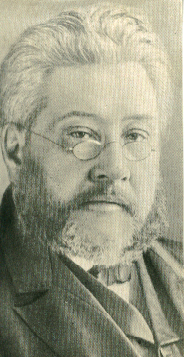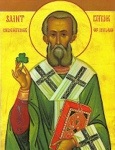 Charles Spurgeon
Charles Spurgeon
For those who don’t know much of Charles Haddon Spurgeon, he really was a boss.
John Piper does great biographies and his on Spurgeon can be enjoyed by audio or written word. Now, two things from yesterday’s message.
1.) The extended quote from yesterday on prayer is this:
Never be content, my brethren in Christ, till all your children are saved. Lay the promise before your God. The promise is unto you and unto your children. The Greek word does not refer to infants, but to children, grand-children, and any descendants you may have, whether grown up or not. Do not cease to plead, till not only your children but your great grand-children, if you have such, are saved. I stand here today a proof that God is not untrue to his promise. I can cast my eye back through four or five generations, and see that God has been pleased to hear the prayers of our grandfather’s grandfather, who used to supplicate with God that his children might live before him to the last generation, and God has never deserted the house, but has been pleased to bring first one and then another to fear and love his name. So be it with you: and in asking this you are not asking more than God is bound to give you. He cannot refuse unless he run back from his promise. He cannot refuse to give you both your own and your children’s souls as an answer to the prayer of your faith.
“Ah,” says one, “but you do not know what children mine are.” No, my dear friend, but I know that if you are a Christian, they are children that God has promised to bless.
“O but they are such unruly ones, they break my heart.” Then pray God to break their hearts, and they will not break your hearts any more.
“But they will bring my grey hairs with sorrow to the grave.” Pray God then that he may bring their eyes with sorrow to prayer, and to supplication, and to the cross, and then they will not bring you to the grave.
“But,” you say, “my children have such hard hearts.” Look at your own. You think they cannot be saved: look at yourselves, he that saved you can save them. Go to him in prayer, and say,
“Lord, I will not let thee go except thou bless me;” and if thy child be at the point of death, and, as you think, at the point of damnation on account of sin, still plead like the nobleman (of John 4), “Lord, come down ere my child perish, and save me for thy mercy’s sake.” And oh, thou that dwellest in the highest heavens thou wilt never refuse thy people. Be it far from us to dream that thou wilt forget thy promise. In the name of all thy people we put our hand upon thy Word most solemnly, and pledge thee to thy covenant. Thou hast said thy mercy is unto the children’s children of them that fear thee and that keep thy commandments. Thou hast said the promise is unto us and unto our children; Lord, thou wilt not run back from thine own covenant; we challenge thy word by holy faith this morning—”Do as thou hast said.”
2.) I also mentioned Spurgeon’s famous sermon, “Children Brought to Christ, and Not to The Font”
Today most people know St. Patrick for green beer, banishing snakes from Ireland, using shamrocks to teach the Trinity, or his walking stick growing into a living tree. Indeed, none of these legends has anything to do with the real Patrick.
However, the factual accounts of Patrick, missionary to Ireland, are even more compelling than the folklore. Telling the true story of Patrick provides an inspiring lesson in God’s grace and mercy.
While other 1,500-year-old characters in history are difficult to research because too few writings have survived time, Patrick is hard to study because so much has been written about him. The bulk of the writings on Patrick are lore, fiction, and embellishment. In uncovering the real Patrick we must sift through ten fictional accounts of his life to find one factual work.
From Slave to Evangelist
As a teenager Patrick was kidnapped, taken from his home in southern Britain, and sold into slavery on the island of Ireland. During his six years as a slave he converted to Christianity and earned a reputation as a fervent evangelist. In the dark of the night Patrick escaped his bonds and fled Ireland. Following a long journey home he entered theological training and full-time service to the Lord. God spoke to Patrick in his dreams and told him that he would return to Ireland and serve as a missionary to the people who had kept him in servitude.
In AD 432, 25 years after fleeing Ireland, Patrick returned to the place of his bondage. He did not return with malice in his heart, but as a missionary eager to convert the Irish. Patrick served in regions of Ireland where outsiders had never traveled. While roaming through Ireland he preached to pagans and also instructed Christian believers. Patrick trained Irish helpers and ordained native clergy. He was bringing a new way of life to a violent, war-oriented pagan culture. His work was both groundbreaking and Christ-honoring.
“Daily I expect to be murdered or betrayed or reduced to slavery if the occasion arises,” Patrick wrote while serving in Ireland. “But I fear nothing, because of the promises of heaven.”
Many brutal kings and warlords felt threatened by Patrick’s work. In order to obtain the favor of local leaders and to gain safe passage, Patrick paid penance, or bribes, to authorities. He used the rulers to gain access to their lands just as they used Patrick to gain wealth and favor with Christians. Of the bribes he paid, Patrick proclaimed, “I do not regret this nor do I regard it as enough. I am paying out still and I shall pay out more.”
Missionary Ahead of His Time
In fifth-century Ireland women were a commodity. Selling a daughter or arranging a politically strategic marriage was common and advantageous to a family. Patrick upset the social order by teaching women they had a choice in Christ. As God converted these women to Christianity, some became full-time servants of Christ in the face of strong family opposition. Patrick told women they could be “virgins for Christ” by remaining chaste. This newfound control was appealing to many women, but it angered many men who believed Patrick was taking away their prized possessions.
At the time many scholars regarded Ireland as the end of the earth, or at least the edge of the inhabitable portion of earth. The collapsing Roman Empire supported many beliefs that civilized society was drawing to a close. Politicians and philosophers viewed Ireland as barbaric and untamable. Many Christians did not believe the Irish were worthy of being saved. At that point in history, Patrick truly served as a pioneering missionary to a forgotten people.
Patrick advocated learning among Christians. He promoted the ascetic life and monasticism. The Irish culture did not place great value on literacy or education. Patrick, however, promoted studying the Scriptures as well as reading books written by fathers of the faith.
Recovering the True Patrick
Patrick entered an Ireland full of paganism and idol worship. But just a few short decades after Patrick arrived, a healthy, Christ-honoring church was thriving. The Irish church was so strong that in the centuries to come it would send missionaries to evangelize much of continental Europe. Patrick’s legacy lives on through the countless spiritual grandchildren he left to continue his work.
Patrick lived in a way that brought honor to God. His devotion and resolute obedience offer examples for all followers of Christ. Patrick stood in the face of great challenges and did not falter. His service, his life, and his unwavering commitment to spreading the gospel of Christ are as commendable today as they were in the fifth century.
We as Christians have allowed the modern, secular customs of St. Patrick’s Day to steal away one of the greatest missionaries in Christian history and reduce his memory to leprechauns, green beer, and fictional tales. Let’s take back our beloved servant of Christ and share God’s glory achieved during the life of Patrick the missionary to Ireland. Let’s share the true legacy of this great Christian evangelist.
From The Gospel Coalition
My father was a wonderful story teller. Mostly they were stories of his grandparents, parents or his childhood and adolescent years. Much of what I know about my lineage is not in the details of a family tree, it is through stories that captivated my imagination as a child sitting at the dinner table.
Spiritual parenting is learning how to become a storyteller as one who is connected to a larger story. During the Friday evening session we will learn about creating an environment of storytelling and an environment of identity (rooted in Christ). Much like my dad teaching me about our family lineage through story and me knowing where I came from, there is another story that must be told to our children. John Westerhoff says, “At the heart of our Christian faith is a story…Unless the story is known, understood, owned, and lived, we and our children will not have Christian faith.”
During this session we will be introduced to the Big God Story. This is telling our children the story of God’s promise to his people. For those of you who read the Jesus Storybook Bible or The Big Picture Bible with your children, you have seen how the promise of Jesus, or God’s covenant, is weaved into each story — this is God’s covenant to His children. “If we consistently tell our children the Big God Story and help them to see the bigger story that has been lived out for thousands of years, they will have the privilege of catching a glimpse of the wonder of it all. The wonderful mystery of who God is and how He has chosen a part for each of us to play.” Also during the Friday evening session we will learn how to create an environment of identity. It is through learning about our identity as part of God’s family, that we learn about God’s promise to send the rescuer and about our Christian lineage.
The world tells our children that their identity is found in who their friends are, what sort of car they drive, the clothes they wear, their academic or athletic abilities. They can struggle to understand what it means to find identity in Christ. During this session we will learn how to create an environment that helps our children think differently about themselves, to help them see that not only are they image bearers of God, but God is their father.
“As we live in our identity, seeking to live out the life we were created to live in Christ, then we can genuinely ask the next question: ‘Who did God create my child to be?’ It is here that we begin to understand the Father’s heart for spiritual parenting.”
Spiritual parenting is helping our children see God’s Big Story and to see that God has a role for them in that story.
We would love to have you join us for the Friday evening session (as well as Saturday), registration has opened! You may register at this link.
O God,
You declare Your almighty power
chiefly in showing mercy and pity:
Grant us the fullness of Your grace
that we,
running to obtain Your promises,
may become partakers
of Your heavenly treasure;
through Jesus Christ our Lord,
who lives and reigns with You and the Holy Spirit,
one God, for ever and ever. Amen.
–The Book of Common Prayer
Sunday in our services we will partake in the sacrament of baptism. This is not a passive experience for all the dry heads! Some helpful thoughts from David Mathis of Desiring God Ministries:
Bringing to mind our baptism is a potent way of bringing ourselves back to the gospel dramatized in the baptismal waters. In calling to mind our own baptism’s. . . . significance in pointing to what Jesus has accomplished for us, and what benefits he gives to those who believe.
Baptism can be a means of grace throughout our lives as we observe, with faith, the baptisms of others and bring to mind the riches of the reality of our identity in Christ pictured in our baptism (Romans 6:3–4; Galatians 3:27; Colossians 2:12).
So, whether in temptation or in observing someone else’s, don’t let your own baptism be a forgotten reality. There’s more grace in those waters — not in being re-baptized, but in remembering your one baptism — even as there’s an eternity of grace in our ongoing faith in Jesus and his cross.
About This Blog
This blog is one of the primary ways that Christ Community's staff can connect and share information. Look for important updates on our community life here each week.
Visit the CCC Website.
View our Church Calendar.
Reminders & Reflections
Blog Archive
- June 2015
- May 2015
- April 2015
- March 2015
- February 2015
- January 2015
- December 2014
- November 2014
- October 2014
- September 2014
- August 2014
- July 2014
- June 2014
- May 2014
- April 2014
- March 2014
- February 2014
- January 2014
- December 2013
- November 2013
- October 2013
- September 2013
- August 2013
- July 2013
- June 2013
- May 2013
- April 2013
- March 2013
- February 2013
- January 2013
- December 2012
- November 2012
- October 2012
- September 2012
- August 2012
- July 2012
- June 2012
- May 2012
- April 2012
- March 2012
- February 2012
- January 2012
- December 2011
- November 2011
- October 2011
- September 2011
- August 2011
- July 2011
- June 2011
- May 2011


